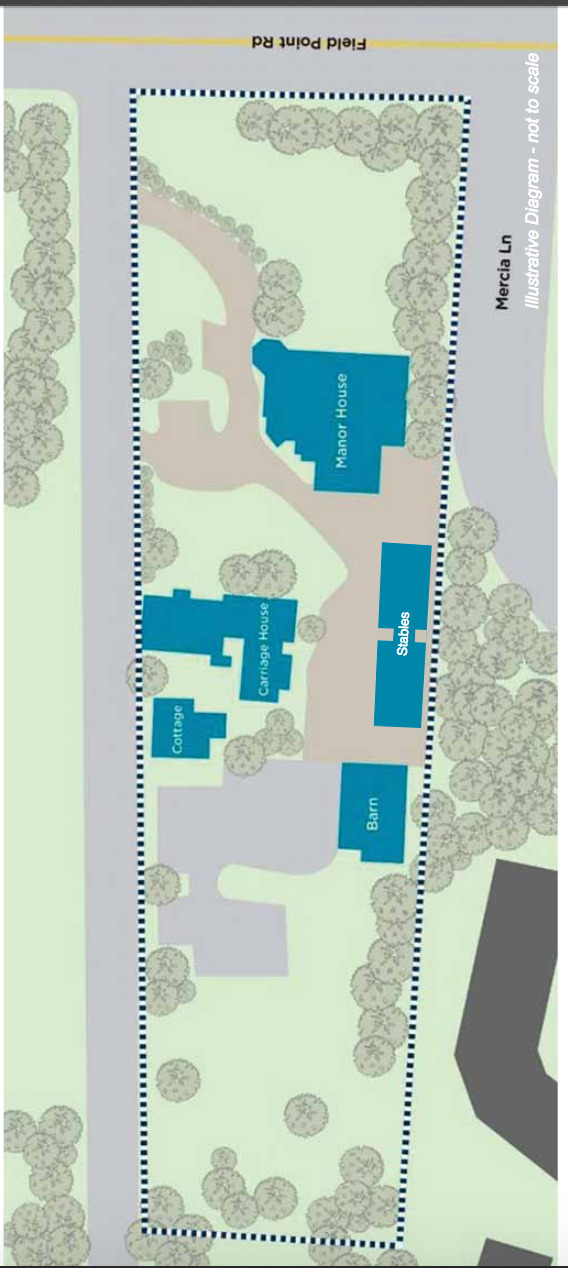Proposed changes to the Homestead Inn were scrutinized by P&Z commission on Tuesday.
Neighbors shared concerns that the developer was planning to expand the legally non-conforming use and turn the property into condos or time-shares. There were fears of parties, amplified music, and long-stay guests at the historic inn.
About 50 people waited six hours to listen and many testified.
The inn is considered a pre-existing, non-conforming use in a residential neighborhood.
The P&Z commission will have to determine whether the proposed changes were “expanding” the non-conformity or “intensifying” it.
Attorney for the applicant, Tom Heagney, noted that “intensification” of use of the inn and restaurant was allowed, but expansion was not.
He said the plan was to reduce the number of guest rooms from 19 to 14, and reduce the number of seats in the restaurant from 120 to 100.
“We have added a garage building and a two-car garage attached to the relocated barn, but we are still conforming,” he said.
The existing FAR is 18,700 sq ft and with new construction it will rise to 23,000 sq ft.
And still Heagney said the property will have 2,000 sq ft of FAR to spare.

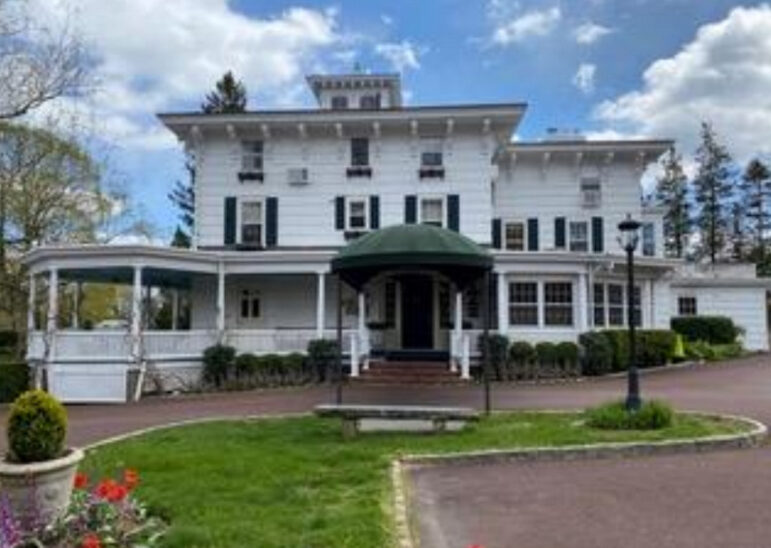
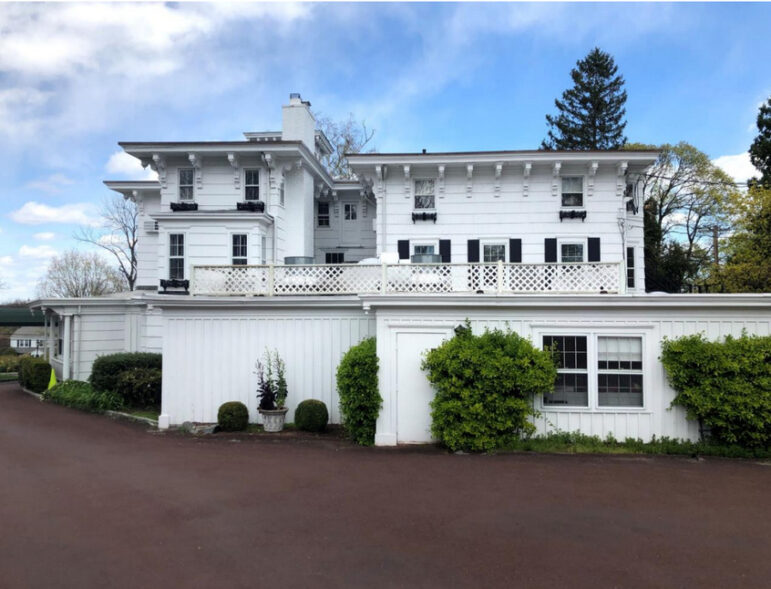
Phase 1 was in progress and included interior renovation and replacement of windows on the Manor House, the cottage and carriage house. Phase 2 involves adding a garage building with 2 guest suites above it.
There were some questions about the amenities in the guest suites. At the briefing on Monday the plans showed some laundry facilities in guest suites.
“Guest suites will not have cooking facilities. They will not have dishwashers. They will not have washers and dryers,” Heagney said, adding that while plans for the two units over the garages showed laundry facilities, that will not be the case.
“This is a high end inn,” he said. “Frankly, I don’t think that somebody who is paying $1,000 a night for a room is really going to want to do their laundry.”
In response to questions at the Monday briefing, Heagney shared relevant definitions:
He said there were no kitchens in the guest suites. Kitchen is defined as having appliances for cooking. There will be under-counter mini bars with small bar sinks, which are permitted in hotel rooms.
The definition of hotel is to have 13 or more or more guest rooms and “inn” is included in the definition of hotel.
“We will have a reception desk. We will have a concierge. We will have concierge services and daily maid service. It will operate as it has in the past as a high-end inn,” Heagney said.
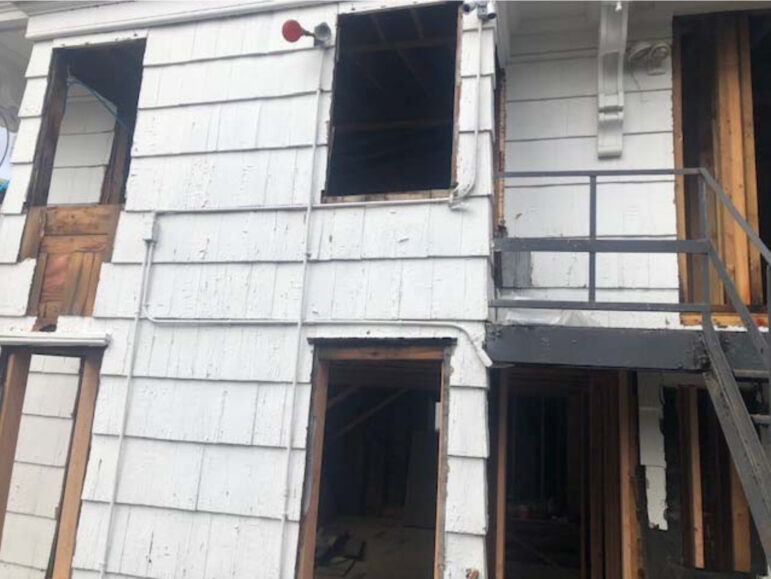
Mr. Heagney said that the integrity of the Manor House and barn had come up at the previous day’s briefing, but that the structural engineer for the project, Jim DeStefano, verified in a letter he had done periodic inspections revealing no concerns with the structural soundness.
Part of the public record for the application was a New York Times article about The Maples Inn in New Canaan that had collapsed during the process of being restored by the applicant, Andrew Glazer.
“If anything structural went wrong with this building, you would have to return to the commission, if we were to approve this,” Alban said. “You’d have to come back to us and start all over again.”
Heagney said renovations to the interior of the Manor House and cosmetic changes its outside fell under the purview of the Building Dept.
“We have an entire property before us that is a non-conforming use. If you allow that non-conforming use to collapse…we would ask that you return if anything goes wrong. Further, that the relocation of the barn, if anything goes wrong – same thing,” Alban said.
Commissioner Arn Welles noted the windows of the Manor House had been removed a year earlier, exposing it to the elements.
“If a building fell down due to a hurricane or other reasons, would the non-conforming use still stand?” he asked.
Heagney said if the building fell down or was knocked down, it could be rebuilt without a variance.
“There has to be proof of abandonment, of an intent to abandon the non-conforming use. The state made it very difficult for a municipality to establish abandonment,” Alban said.
“There appears to be no protection for the existing Manor House and the other buildings,” Mr. Welles said.
“That is true,” Alban said, noting there was no Historic Overlay.
“The applicant has to be willing to do it, and has not demonstrated willingness,” she said.
Mr. Heagney said the new windows had arrived and that he’d had discussions about the windows with attorney Joel Green who was representing the neighbor at 3 Mercia Lane.
As for the barn, he said it would be disassembled and re-erected on a new foundation.
“What is at issue is the use, not the square footage,” commissioner Heagney said.
Mr. Heagney agreed. “The commission deals with use.”
“You cannot expand, but you can intensify,” Alban said. “You can let the baby elephant grow, but you can’t add lions.”
Alban said Ada’s in Riverside was a similar example. It had originally been a post office, then a candy and newspaper shop for decades before becoming Ada’s Kitchen & Coffee.
Condominiums
Referring to the statute on condominiums, Mr. Heagney cited CT General Statutes Chapter 828, 47-205 on applicability of real property law to the conversion to common interest form of ownership.
“No zoning, building code, subdivision or other real property use law, ordinance or regulation may prohibit the conversion of any building for the common interest ownership form of ownership.”
“This is a common way of high end hotels and inns being constructed now,” Heagney said, adding that Ocean House in Westerly, Rhode Island operated that way.
Special Events
Mr. Yeskey asked if the applicant would plan special events and parties, and whether there could be a condition of approval against events, fundraisers, car storage or amplified music.
Ms Alban said the applicant could plan events if the inn had previously done so.
“We could condition that you would not add events to what has been done historically,” she said.
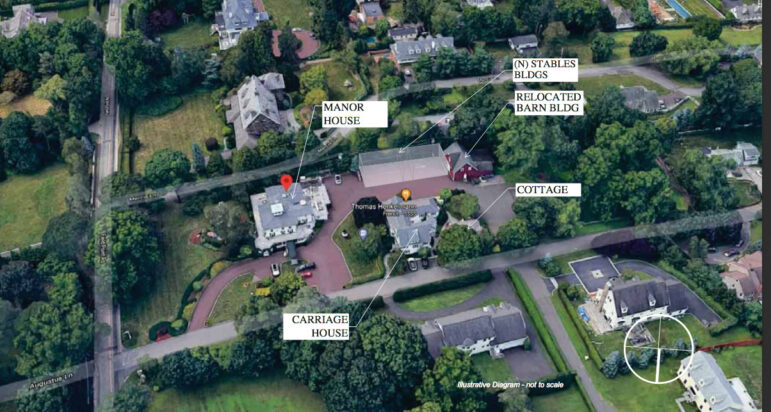
Attorney Green said neighbors had deep concerns about the proposed condominium form of ownership.
He said if the inn were to fail, there would be several property owners coming to the commission to modify zoning regulations to protect their investment or going to the ZBA for variances.
“It is our view that this proposed reconfiguration of the site is not appropriate or legally permitted,” he said.
He pushed back when Mr. Heagney repeated that the number of guest suites and restaurant seats were being reduced.
“I would suggest that does not tell the full story. What’s happening is a new building in the stable is being constructed and will have impacts…” Mr. Green said he didn’t think that the town’s regulations spoke directly to new buildings in terms of non-conforming uses, but rather spoke to additions and alterations.
Alban said CT state statutes now require that P&Z commissioners attend training in land use issues.
She read from the upcoming CT Bar Association seminar for P&Z commissions that covered three factors relevant to expansion versus intensification.
“Zachs Factors”
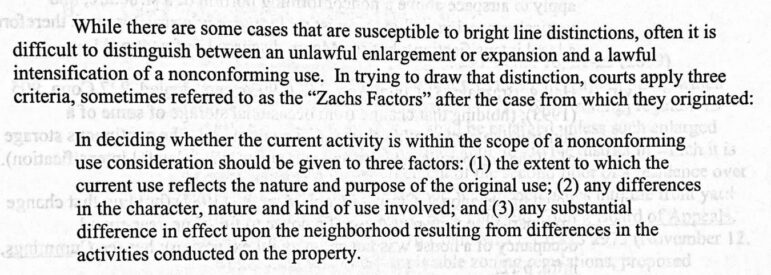
During public comment Cindy Conarroe, a neighbor from across Field Point Road, said she was concerned about the condo use and wondered whether the restaurant would accommodate take-out orders, which she suggested would expand the use of the restaurant.
“And certainly concern about increased traffic and activity. With time-shares there have been issues in the past.”
Conarroe said her family was concerned the inn would be a destination for events and might include loud music.
Tina Volkwein a neighbor on Field Point Road said she had observed the main Manor House being open to the elements for the better part of a year.
“One could imagine if they had ordered replacement windows, they would have boarded up the openings to protect the building,” Volkwein said. “We are concerned about that building’s health.”
She said a time-share format could potentially increase usage of the rooms, and that two bedrooms suites could also increase the number of guests at any given time, despite the reduction of guest rooms from 19 to 14.
Dr. Cap Lesesne said he believed the proposal was a substantial expansion, not an intensification, particularly the covered parking spots and the changes to the stables, which he said reflected a profound change of use.
Ms Volkwein said she believed the ownership did impact the use.
“If they have separate owners, deciding whether or not to use their unit affects the overall use of the property as a whole,” she said. “By purchasing a unit people would have certain rights to be able to use it, but if they are not using it then it would be operated as a hotel where rooms would be rented out on a daily basis.”
“It is a form of how the unit is paid for – whether it is paid for as a time-share, or a condominium, how it is used is the same. It doesn’t impact zoning,” Ms Alban said.
Town Planner Pat Larow said “unit” was a different term, the right expression was suites.
“She’s asking, can you sublet a hotel room?” Alban said.
Mr. Yeskey said, “Whoever depends on the unit, they may be intensifying the use, but they’re not expanding the use.”
“They are expanding it,” Volkwein said. “An owner of a suite can be continuously living there for a period of time, which would not be the same use as before.”
“That is a great question, that is exactly what we have to decide,” Alban said.
Connaroe asked about parties and if there would be a written limit on the number of occupants in a suite. “It says two, can we limit it to that? The suites are much bigger than the old rooms were.”
“You can have a bunch of your friends over – I hear the problem,”Alban said.
“That would change the usage,” Connaroe said.
“Yes, mam, very good point,” Alban said.
Mr. Heagney agreed to an extension, and the item was left open.
“If you have a closed garage in which you could protect your car for a long period of time, might that change from the typical inn, to a much longer term stay, and thus changing the nature of the use?” Alban said. “I’m struggling with that.”
Heagney said if people stayed for longer periods of time it wouldn’t change how many people would be staying at the inn. “And if my client runs the inn better than the prior owner did, that’s an intensification.”
Commissioner Mary Jenkins asked if a suite owner could come and stay as long as they wanted to?
Mr. Heagney said that might occur.
